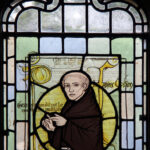

Augustine, and to a lesser extent Boethius.Īnselm sought to understand Christian consciousness through reason, although he insisted that faith was a prerequisite, and not a result, of such understanding. Arguably, his only major influences are St. He makes very few references to previous thinkers in his work, and his originality and freshness has often been remarked upon. WorkĪlthough Anselm wrote prodigiously throughout his life, his works are generally unsystematic tracts or dialogues on detached questions, not elaborate treatises like the works of Saint Thomas Aquinas. He was canonized by the Roman Catholic Church in 1494, and declared a Doctor of the Church in 1720.

However, only three years later, in 1109, he died. It was only after King Henry was threatened with excommunication by the Pope that some reconciliation took place, and Anselm was able to once again take up his position. William's successor, Henry I, was no easier to deal with and in 1103 Anselm again set out for Rome and was again refused re-entry back into England. In 1097, Anselm set out for Rome in an attempt to settle some of the English King's ecclesiastical problems, but was refused entry back into England and remained in exile until King William died in 1100, during which time he continued to write. However, his tenure was not an easy one, with King William II of England constantly trying to appropriate church lands, offices and incomes, and even to have Anselm deposed. In 1092, at the invitation of Hugh, Earl of Chester, Anselm crossed to England where, against his will, he was offered the prestigious position of Archbishop of Canterbury.

Just three years later, he was elected Prior to the Abbey and then, in 1078, he succeeded Lanfranc as Abbot.ĭuring these quiet years he wrote his first and most important works of philosophy (the "Monologion", the "Proslogion", the "Dialogues on Truth", "Free Will" and the "Fall of the Devil") and, under Anselm's jurisdiction, Bec grew in wealth and reputation, becoming one of the first seats of learning in Europe. After a short time at Avranches, he entered the Benedictine Abbey of Bec in Normandy, France as a novice in 1060, where he studied under the eminent theologian and dialectician Lanfranc (c. In 1059, after his mother died and his father's harshness became unbearable, he left home, crossed the Alps and wandered through Burgundy and France. His father, Gundulph, was by birth a Lombard and seems to have been harsh and violent his mother, Ermenberga, was prudent and virtuous and gave Anselm careful religious instruction.Īt the age of fifteen, the devout young Anselm tried to become a monk but could not obtain the consent of either his father or the abbot of the local monastery. LifeĪnselm was born in the city of Aosta in 1033 in what was then the Kingdom of Burgundy (modern-day northern Italy) to a noble and propertied family. He held the important position of Archbishop of Canterbury during a particularly turbulent period in English and Papal history. He exercised an important influence on later Scholastics, as well as on subsequent Church doctrine on various theological matters. He is particularly known for his attempt to elaborate a rational system of faith, and as the originator of the Ontological Argument for the existence of God. He is often called the founder of Scholasticism, and is considered by many to be the first scholarly philosopher of Christian theology. Anselm of Canterbury (1033 - 1109) was an Italian philosopher and theologian of the Medieval period.


 0 kommentar(er)
0 kommentar(er)
